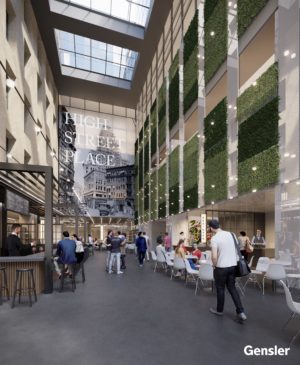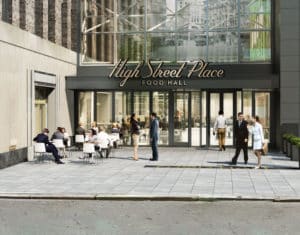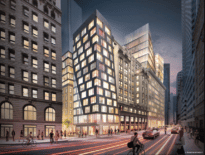
High Street Place food hall in Boston’s Financial District recently announced the first 11 of its 20 planned food and drink vendors in preparation for its fall opening. Image courtesy of Rockpoint Group.
If this were a Tale of Three Foodies, the Fenway’s Time Out Market would be your globetrotting travel writer friend coming to visit America’s most European city. High Street Place would be a buttoned-down Financial District worker looking for an energetic spot for an off-site client meeting. And the TD Garden food hall is the diehard Boston fan who wants to revisit the action on Causeway Street even after the winter sports season wraps up.
Boston’s year of the food hall debuts with the projected opening of Time Out Market in June, followed by the fall openings of two competitors. The three projects enable landlords to energize underutilized spaces while creating new amenities for new and potential future office tenants.
For Boston-based Samuels & Assoc., the retail industry’s volatility presented an opportunity to replace a shrinking big-box chain with a who’s-who of local chefs and bartenders at the former Landmark Center in the Fenway, now known as 401 Park. Time Out Market is the culmination of the $150 million transformation of the 1.2-million-square-foot Art Deco edifice that Samuels acquired in 2011.
Time Out Market considered several locations before Samuel & Assoc. convinced the restaurant of Boston’s benefits, said Peter Sougarides, an executive vice president at Samuels & Assoc. “Boston wasn’t in their original thought process, but they fell in love with the building and the neighborhood as well.”
Wegmans supermarket had been in talks to anchor the 300,000 square feet of retail space at 401 Park, but the plans for a supermarket and multifamily housing were shelved because of the complexities of replacing the existing garage with underground parking. Best Buy closed its 2-story store on the southern end of the building in late 2014.
Enter Time Out Market, a venture by London-based travel guide publisher Time Out Media, whose original location in Lisbon, Portugal, averages 10,000 visitors a day. The Fenway location is one of five North American Time Out Markets opening this year, along with Miami, New York, Chicago and Montreal.
Samuels selected Time Out because of its proven success in Portugal and its understanding of the Fenway neighborhood and local dining scene, Sougarides said. Samuels leases the 20,000-square-foot space to Time Out, which selected vendors including veteran local restaurateurs Michael Schlow and Tony Maws. Time Out Market will employ about 70 employees of its own.
“It’s their responsibility to select the individual restaurateurs and chefs,” Sougarides said. “Every food hall is a little bit different. Their model is they control the look and feel and the whole customer experience, and they curate finding the best chefs in a particular city.”
Construction required the removal of the second floor of the former retail store to create a culinary cavern with 16 food vendors on the north side of the hall, a pair of bar areas at the south and rows of communal seating between.
The arrival of Time Out Market could boost Samuels’ efforts to find an anchor tenant for its 506,000-square-foot office and lab building, which is approved for the corner of the property at Brookline Avenue and Fullerton Street.

High Street Place food hall in Boston’s Financial District recently announced the first 11 of its 20 planned food and drink vendors in preparation for its fall opening. Image courtesy of Rockpoint Group.
Open Late in the Financial District
For Boston-based Rockpoint Group, its $30 million High Street Place food hall will fill a sprawling lobby and generate foot traffic after business hours, when the Financial District largely empties out. Scheduled to open this fall in the atrium connecting 100 High St. and 160 Federal St., the project has announced 11 of 20 planned vendors including Fenway area chef Tiffani Faison and backbar veterans Daren Swisher and Joseph Cammarata.
Rockpoint Group and its management arm, Rockhill Management, selected CANAdev to operate the 18,000-square-foot hall. Gensler and Groundswell Design Group partnered on the layout for the 5-story atrium, which will include retractable window walls opening onto outdoor patio space.
Michael Morris, principal of CANAdev, said developers considered big-box retail, a private event space and coworking space before settling on the food hall concept. The downtown location should attract a daytime crowd of office workers along with tourists, CanaDEV predicts.
Entertainment and special events will be a main focus of activating the space after business hours, with CANAdev and Rockhill Management coordinating movie nights and live sporting events on a retractable projection screen.
“We see this as a critical component for High Street Place’s success on evenings and weekends,” Morris said via email. “High Street Place will offer a comprehensive schedule of events that we hope will attract a broad range of visitors beyond the local tenant community.”
At North Station, a 50,000-square-foot expansion of the TD Garden will make room for a food hall featuring 15 food and drink vendors scheduled to open in time for the NBA and NHL seasons this fall. The target opening date approximately coincides with the initial occupancy of the 38-story Hub50House luxury apartment tower, a CitizenM hotel, a Star Market, 15-screen cinema, Big Night Live concert hall and the new Boston headquarters of online security firm Rapid7 at The Hub on Causeway development. Developers are expected to announce more details on the mix of food vendors this summer.

Steve Adams
An Outgrowth of the ‘Experience Economy’
Food halls operating nationwide have increased from 160 in 2016 to a projected 450 by the end of 2020, according to a recent report by Cushman & Wakefield that analyzed the sector’s explosive growth.
Food vendors benefit from lower startup and operating costs than a standalone restaurant or even a food truck, Cushman & Wakefield researchers noted, helping offset rising wages and an increasingly competitive labor pool.
As the concept has evolved, many landlords have shifted from traditional leases to licensing agreements with operators, the report noted. That gives them flexibility to change tenants and ensure that the mix of vendors remains fresh. Some landlords use universal point-of-sale systems that enable them to track each vendor’s performance in real time, pinpointing laggards.
The diversity of options at food halls gives mixed-use development landlords a competitive advantage against corporate campuses which have brought in catering services, and even played a part in record-breaking real estate transactions such as Google’s $2.4 billion purchase of New York’s Chelsea Market office complex which contains a popular ground-floor food hall.
“The rationale is simple: the experience economy is not merely a retail phenomenon nor is it a simple Millennial quirk,” Cushman & Wakefield researchers noted. “It is a reflection of technology driving longer work hours, greater worker productivity and more time constraints on skilled labor.”




 |
| 

